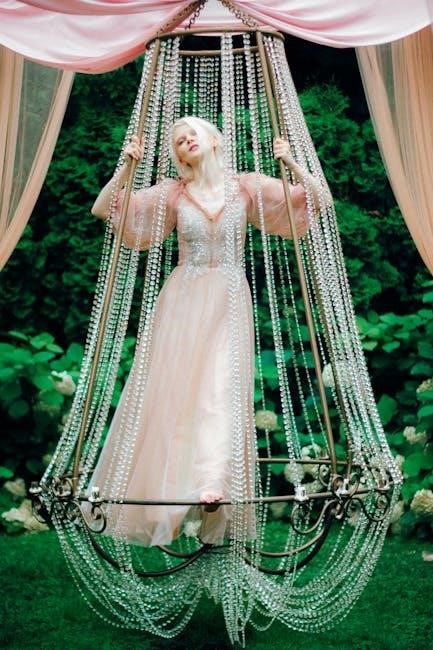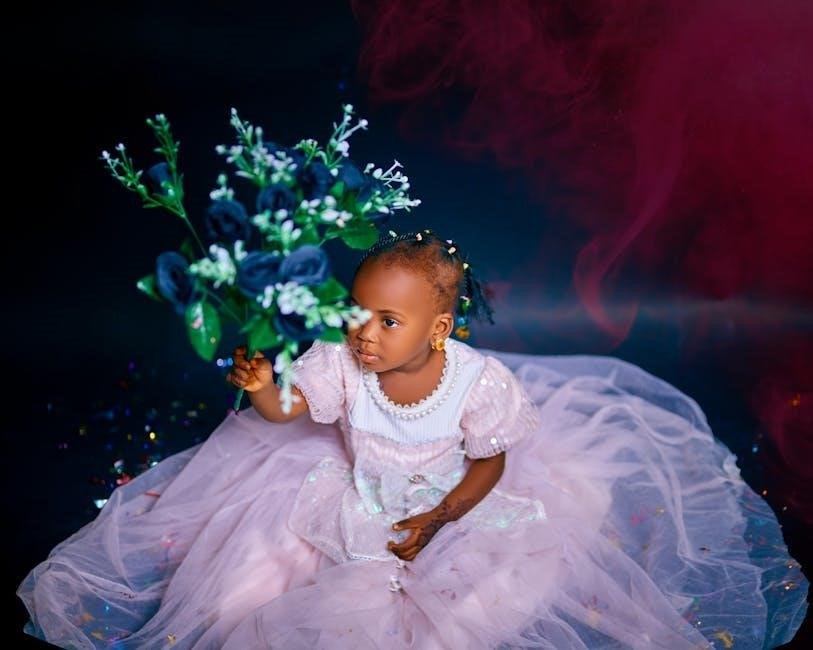The series follows Ruan Qing, a modern president betrayed and murdered, who transmigrates to an ancient Omegaverse world, navigating power struggles and betrayal with his business acumen․
1․1․ Overview of the Series
The series revolves around Ruan Qing, a modern corporate president betrayed and murdered, who transmigrates to an ancient Chinese Omegaverse world․ With his sharp business acumen, he navigates power struggles, betrayal, and vengeance, blending modern strategies with ancient dynamics․ The story explores themes of ambition, survival, and redemption in a rich historical and cultural setting․
1․2․ Main Themes and Genre
The series blends elements of fantasy, romance, and historical fiction, set in an ancient Chinese Omegaverse․ Themes of betrayal, power struggles, and redemption dominate, with Ruan Qing’s journey highlighting vengeance and survival․ The genre explores complex societal dynamics, moral dilemmas, and the protagonist’s strategic brilliance, offering a gripping narrative of ambition and transformation․
1․3․ Target Audience and Popularity
The series appeals to fans of historical fantasy and power struggles, particularly those drawn to complex characters and morally ambiguous themes; Its popularity stems from its unique blend of vengeance, romance, and strategic intrigue, resonating with readers who enjoy intense character development and high-stakes drama in ancient settings․

The Protagonist: Ruan Qing
Ruan Qing, a modern president betrayed and murdered, transmigrates to ancient times, leveraging his business acumen to navigate power struggles and forge a new destiny․
2․1․ Background and Personality
Ruan Qing, a shrewd and ambitious 21st-century company president, is betrayed and murdered by a subordinate, leading to his transmigration into an ancient Omegaverse world․ His resourceful and intelligent nature shines as he adapts to new surroundings, leveraging his commercial expertise to navigate power dynamics and betrayal, showcasing a personality marked by strategic thinking and relentless ambition․
2․2․ Transition from Modern to Ancient Times
Ruan Qing, a modern corporate leader, faces a drastic shift after being betrayed and murdered, awakening in an ancient Omegaverse world․ The contrast between his 21st-century mindset and the hierarchical, power-driven ancient society challenges his perceptions, yet his sharp business acumen and strategic thinking provide a unique advantage in navigating this unfamiliar terrain․
2․3․ Business Acumen in Ancient Settings
Ruan Qing leverages his modern corporate strategies in the ancient world, applying shrewd negotiations and strategic thinking to commerce and politics․ His ability to adapt business principles to feudal dynamics highlights his ingenuity, enabling him to thrive in a society governed by hierarchy and power, where resourcefulness becomes his greatest asset․
The Antagonists and Their Roles
The antagonists, driven by betrayal and ambition, orchestrate murder and power struggles, challenging Ruan Qing’s dominance and forcing him to navigate treacherous alliances and vengeance;
3․1․ Betrayal and Murder in the Modern World
Ruan Qing, a shrewd company president, is betrayed and murdered by a subordinate, triggering his transmigration to an ancient Omegaverse world․ This act of deceit sets the stage for his journey of power struggles and vengeance, reshaping his destiny in unforeseen ways․
3․2․ Power Struggles in Ancient Times
Ruan Qing navigates the complex power dynamics of ancient China, leveraging his modern business acumen to outmaneuver rivals and nobles․ His strategic moves ignite intense power struggles, as he faces opposition from those wary of his influence in the traditional hierarchy of the Omegaverse world․
3․3․ The Subordinate’s Motivation
The subordinate’s betrayal stems from ambition and jealousy, driven by a desire for power and control․ Ruan Qing’s death and transmigration expose the deep-seated resentment and hidden agendas of those around him, revealing a web of deceit and personal vendettas that fuel the narrative’s tension and conflict․
The Power Dynamics and Manipulation
Ruan Qing’s journey highlights his strategic manipulation of ancient power structures, leveraging his modern business acumen to navigate betrayal and assert dominance in a ruthless world․
4․1․ The Concept of “Overlord” in the Series
The term “Overlord” symbolizes absolute authority and dominance, reflecting Ruan Qing’s rise as a powerful figure who masterfully manipulates ancient politics and societal hierarchies with his modern business acumen, embodying both admiration and fear in his relentless pursuit of control and justice․
4․2․ Strategies for Gaining Control
Ruan Qing employs cunning business acumen, leveraging economic strategies and political alliances to assert dominance in ancient times․ His modern tactics, such as resource manipulation and strategic investments, allow him to outmaneuver rivals, establishing himself as a mastermind who thrives in both eras by blending ambition with calculated precision․
4․3․ Moral Dilemmas and Consequences
Ruan Qing faces ethical conflicts as he navigates ancient power dynamics, often resorting to ruthless tactics to survive․ His actions, driven by vengeance and ambition, raise questions about the cost of dominance․ The series explores the moral sacrifices made for power and the emotional toll of manipulating others in a high-stakes world․

The Historical and Cultural Setting
The series is set in an ancient Chinese Omegaverse world, blending historical elements with fantasy․ It explores traditional societal structures, political dynamics, and cultural norms, creating a rich backdrop for Ruan Qing’s journey and power struggles․
5․1․ Ancient Chinese Society and Politics
The series portrays a rigid hierarchical society with complex political intrigue, emphasizing power struggles within royal courts and noble families․ The Omegaverse world adds a unique layer, influencing relationships and alliances․ Ruan Qing navigates this intricate landscape, leveraging his modern Business acumen to manipulate societal norms and rise to prominence in ancient China․
5․2․ The Role of the Omegaverse World
The Omegaverse setting introduces a hierarchical society governed by power dynamics and relationships․ Characters navigate a world where dominance and submission are intrinsic to societal structure․ This unique framework amplifies conflicts, alliances, and romantic tensions, shaping Ruan Qing’s journey as he adapts his modern strategies to thrive in this ancient, rule-bound environment․
5․3․ Cultural Adaptations and Conflicts
Ruan Qing faces significant cultural challenges adapting to ancient societal norms․ His modern business tactics clash with traditional practices, while the Omegaverse hierarchy introduces complexities in relationships and power dynamics․ These conflicts highlight the tension between his contemporary mindset and the rigid expectations of the ancient world, creating a rich backdrop for his journey and decisions․
The Princess and Her Influence
The Overlord Princess wields significant influence through her cunning and strategic mindset, shaping the story’s dynamics and Ruan Qing’s journey in the ancient Omegaverse world․
6․1․ The Character of the Overlord Princess
The Overlord Princess is a dominant, cunning figure who navigates the ancient Omegaverse world with strategic precision․ Her manipulative nature and ambition shape the story’s power dynamics, influencing Ruan Qing’s actions and the unfolding conflicts․ Her character embodies strength, wit, and ruthlessness, making her a central force in the narrative’s intricate web of alliances and betrayals․
6․2․ Her Relationship with Ruan Qing
The Overlord Princess and Ruan Qing share a complex, often adversarial relationship, marked by power struggles and mutual manipulation․ Their interactions are driven by ambition and survival instincts, with each seeking to outmaneuver the other․ Their dynamic shapes the story’s tension, blending rivalry with moments of uneasy cooperation in their quest for dominance and control․
6․3․ Strategies for Survival and Revenge
The Overlord Princess employs cunning political maneuvers and strategic alliances to secure her position and exact vengeance․ Her methods often involve deceit and manipulation, leveraging her influence to dismantle opponents․ Ruan Qing, with his modern business acumen, mirrors her tactics, creating a volatile dynamic where both parties constantly adapt to outwit each other and maintain power․

Themes of Betrayal and Loyalty
Betrayal drives Ruan Qing’s quest for revenge, while loyalty becomes a rare commodity in both modern and ancient worlds, shaping alliances and deadly conflicts․
7․1․ The Impact of Betrayal on the Protagonist
Ruan Qing’s betrayal and murder in the modern world spark a deep-seated desire for revenge, fueling his relentless pursuit of power and justice in the ancient realm he inhabits․
7․2․ Loyalty in Ancient and Modern Contexts
Loyalty in the modern world is tested through personal relationships, as seen in Ruan Qing’s betrayal by his subordinate․ In ancient times, loyalty is tied to power hierarchies and survival, influencing Ruan’s strategies․ His journey highlights the evolution of loyalty from personal trust to a tool for governance and control․
7․3․ Redemption and Forgiveness
Ruan Qing’s journey explores redemption through his rise from betrayal to power, blending personal vengeance with forgiveness․ His loyal allies, like Mu Han Zhang, embody unwavering dedication, while his own path reflects the duality of revenge and mercy, shaping his character in both modern and ancient worlds․

The Significance of the Title
The title reflects Ruan Qing’s transformation from a modern overlord to an ancient strategist, guiding his rise to power through betrayal, vengeance, and strategic dominance․
8․1․ “Rollover Guide” and Its Implications
The title “Rollover Guide” symbolizes Ruan Qing’s journey from modern betrayal to ancient dominance, highlighting his strategic adaptation and rise to power through cunning and business prowess, serving as a metaphor for navigating power dynamics and societal transitions with calculated precision and relentless ambition․
8․2․ The “Overlord Type” of Princess
The “Overlord Type” princess embodies dominance and strategic brilliance, navigating ancient power struggles with cunning and ruthlessness․ Her character represents both strength and vulnerability, blending ambition with emotional complexity, making her a formidable force in the story’s intricate web of alliances and betrayals․
8․3․ Symbolism and Metaphors
The series uses time transitions and power struggles as metaphors for self-discovery and resilience․ Betrayal symbolizes the darkness of human nature, while the princess’s dominance embodies strategic brilliance and emotional complexity, reflecting the duality of strength and vulnerability in pursuit of power and survival․
The Series’ Cultural Impact
The series has sparked significant discussions globally, blending ancient Chinese dynamics with modern themes of betrayal and power, resonating with fans and inspiring fan theories and adaptations․
9․1․ Reception in China and Beyond
The series has gained significant popularity in China and internationally, praised for its unique blend of ancient Chinese culture and modern storytelling․ Its ranking and fan base continue to grow, with readers appreciating its intricate plot and strong character development, making it a standout in the literary world․
9․2․ Fan Discussions and Theories
Fans actively discuss the series, theorizing about Ruan Qing’s strategies and the princess’s true intentions․ Debates over the Omegaverse dynamics and cultural conflicts are prevalent․ Predictions about Ruan Qing’s future and the princess’s role in his revenge dominate forums, showcasing the community’s deep engagement with the narrative and its intricate themes․
9․3․ Influence on Similar Works
The series’ success has inspired similar works, blending historical settings with modern business strategies․ Its complex characters and power dynamics have set a benchmark, encouraging more authors to explore Omegaverse themes and intricate revenge narratives, thus shaping the future of the genre and influencing new adaptations and cultural themes․
The series is a compelling tale of ambition, revenge, and resilience, with Ruan Qing’s journey from betrayal to ancient domination captivating audiences, blending historical and modern elements uniquely․
10․1; Summary of Key Points
Ruan Qing, a betrayed modern president, transmigrates to an ancient Omegaverse world, leveraging his business acumen to navigate power struggles and betrayal․ The series explores themes of loyalty, vengeance, and cultural adaptation, blending historical and modern elements to create a unique narrative of resilience and ambition․
10․2․ Future Prospects for the Series
The series shows promise for expansion, exploring deeper Omegaverse dynamics and political intrigue․ Future chapters could delve into Ruan Qing’s legacy and the evolving power structures, offering fans a richer understanding of the protagonist’s journey and the world’s cultural landscape, potentially inspiring adaptations and further fan engagement․
10․3․ Final Impressions and Recommendations
Ruan Qing’s journey offers a gripping blend of power struggles, betrayal, and redemption․ Fans of complex characters and historical drama will find this series engaging․ However, due to its mature themes, it is recommended for adult readers who enjoy intense storytelling and moral dilemmas set in ancient and modern contexts․
